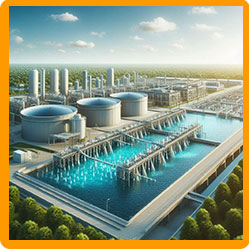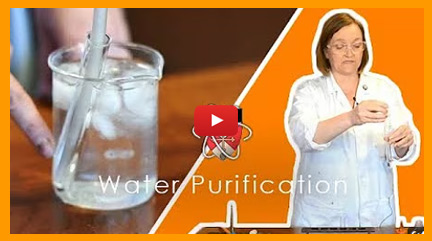
Using Earth's Resources
This topic explores how we use natural materials, manage finite resources, produce clean water, and develop industrial processes to meet human needs sustainably. It links chemistry with real-world problems like waste, pollution, and resource depletion.
Practicals on this page:
Water purification
Natural and Finite Resources
Natural resources are materials we get from the Earth, like wood, metals, air, and water. Some are renewable (e.g. crops, timber) — they can be replenished. Others are finite, such as fossil fuels and metal ores, and will eventually run out.
To make better use of these resources, scientists and engineers aim to improve sustainability — making sure we meet today's needs without compromising the future.
Materials: Ceramics, Polymers, and Composites
- Ceramics (e.g. glass and clay) are hard, heat-resistant, and non-metallic.
- Polymers are made from repeating chains of monomers and are used in plastics, textiles, and more.
- Composites combine two or more materials (e.g. concrete, carbon fibre) to get properties from both.
We use different materials depending on whether we need strength, flexibility, or durability.
Metals, Alloys, and Corrosion
- Pure metals are soft, so we mix them to form alloys with improved properties.
- Steel is an alloy of iron — different types are used in construction, tools, and appliances.
- Corrosion is when metals react with substances like water or oxygen.
- Rusting is a specific type of corrosion affecting iron and steel.
To prevent rust, methods include:
- Painting or coating with plastic
- Galvanising (coating with zinc)
- Sacrificial protection (using a more reactive metal)
Revision Notes

The Cornell method is like a supercharged note-taking system that helps you ace your revision!
Print out our blank revision notes pages to help you revise.
How to make effective revision notes with the Cornell method.
Exam Questions & Answers

Download and print off practice our FREE worksheet with exam style questions on Cell Biology.
Extracting and Recycling Resources
Extracting finite resources (like metals from ores) can be expensive and harmful to the environment. To reduce this, we:
- Recycle metals (e.g. copper, aluminium, steel) to save energy and raw materials
- Reuse and repurpose items to reduce waste
- Use Life Cycle Assessments (LCAs) to compare the environmental impact of products (e.g. plastic vs paper bags)
An LCA looks at raw materials, manufacturing, usage, and disposal.
Potable Water and Waste Water Treatment
Potable water is safe to drink, but not necessarily pure (chemically). It’s made by:
- Filtering out solids
- Sterilising with chlorine, ozone, or UV light
Sources vary:
- In the UK, from rainwater (stored in rivers, lakes, aquifers)
- In dry countries, via desalination of seawater
Waste water (from homes, agriculture, and industry) must be cleaned before being released. Treatment involves:
- Screening and sedimentation
- Aerobic and anaerobic digestion
- Removal of harmful chemicals in sewage treatment
Industrial Chemistry: The Haber Process and Fertilisers
The Haber process is used to make ammonia from nitrogen and hydrogen. Ammonia is crucial for making fertilisers.
NPK fertilisers provide essential elements:
- Nitrogen – for leafy growth
- Phosphorus – for strong roots
- Potassium – for flower and fruit production
They’re made from mined compounds or industrial reactions, helping crops grow faster and increasing food supply.
Also see The Earth's Atmosphere, Crude Oil & Fuels, Polymers
PRACTICAL - Water Purification
In this GCSE Chemistry practical, you’ll investigate how to purify water using simple techniques. The aim is to test and improve the quality of different water samples (e.g. seawater, rainwater, tap water) by removing solids and impurities.
You’ll typically:
- Test the water samples for pH and dissolved solids (using a pH probe and evaporation).
- Filter the water to remove insoluble solids like dirt or sand.
- Distil the water using simple distillation to separate pure water from dissolved salts.
This experiment helps you understand how potable (drinkable) water is produced and why filtration and distillation are important for making water safe to drink.
Revision Notes

The Cornell method is like a supercharged note-taking system that helps you ace your revision!
Print out our blank revision notes pages to help you revise.
How to make effective revision notes with the Cornell method.
Why Do I Need to Know About Using The Earth's Resources?
In Everyday Life
- Making informed choices about recycling, sustainability, and product use
- Understanding how clean drinking water is produced and why it’s important
- Reducing your environmental footprint by choosing sustainable materials
- Recognising the impact of fertilisers, plastic use, and waste
- Appreciating how industries balance needs with environmental protection
In Science & Chemistry Careers
- Designing sustainable products and packaging
- Working in environmental science, water treatment, or waste management
- Developing new materials for construction, medicine, or technology
- Improving recycling and metal extraction techniques
- Contributing to agricultural efficiency through fertiliser development and soil chemistry



